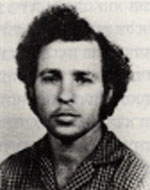Reisner, Yehuda
Yehuda, son of Yaffa and Yosef, was born on the 18th of Av 5710 (1.8.1950) in Gvat. When he was four, his family moved to Kibbutz Yifat, where he grew up and was educated. He studied at the kibbutz elementary school and later continued his studies at the vocational school at Kibbutz Mizra. He was a simple, courteous child, but his Lev was not particularly attracted to school. The draw was always full of cars and tractors instead of notebooks and books. From his childhood, he was gifted with a special technical sense and “golden hands” that distinguished him from the other children. He always dismantled and built, broke and repaired – first toys and then appliances. He was naturally a quiet, withdrawn child with a broad Lev and always ready to feel the help of others. Though short, he excelled in good physical shape and was very quick. He was a member of the youth brigade of the Union of the Kibbutzim and Kibbutzim and of the Gadna Brigade’s platoon, where he won two silver medals for his achievements in shooting, and was drafted into the IDF in early November 1968 and assigned to the Armored Corps. After basic training and after finishing a tank course and tank commander course, he was stationed in a unit that spent most of the time in the front lines. He was a good soldier and loved his commanders and his comrades in the unit. He was always careful to stay in close contact with the house and his holidays preferred to spend time with his beloved family. In 1971, he was discharged from regular service in the IDF and returned to the agriculture, and quickly joined the agricultural machinery factory and was sent to a training course at Midreshet-Ruppin, where he became a friendly, open and loving person, organizing parties and taking an active part in them. The Yom Kippur War was to be sent by the kibbutz to Cyprus, accompanied by the factory, and when the Yom Kippur War broke out, Judah was drafted and sent to the Sinai front, and he participated in the battles of the breakout and the break-in to the west bank of the Suez Canal. 1973.) When he was fighting in the Misuri area north of the Chinese Farm, his tank was hit, and he jumped out of the tank and tried to stop He was brought to rest in the cemetery of Kibbutz Yifat, where he left behind his parents and two brothers, and was promoted to the rank of First Sergeant In a letter of condolence to the bereaved family, his commander wrote: “Until now we have forcibly pushed the pain into corners We remain hidden in our hearts and continue our military pursuits, keeping the lines and standing ready. Now, when liberation is in sight, the pain breaks out again. The thought that Yehuda is not with us, because he will not shake hands with Frida again, because we can no longer say to him, ‘See you in the next reserves,’ this is an unbearable thought. “
